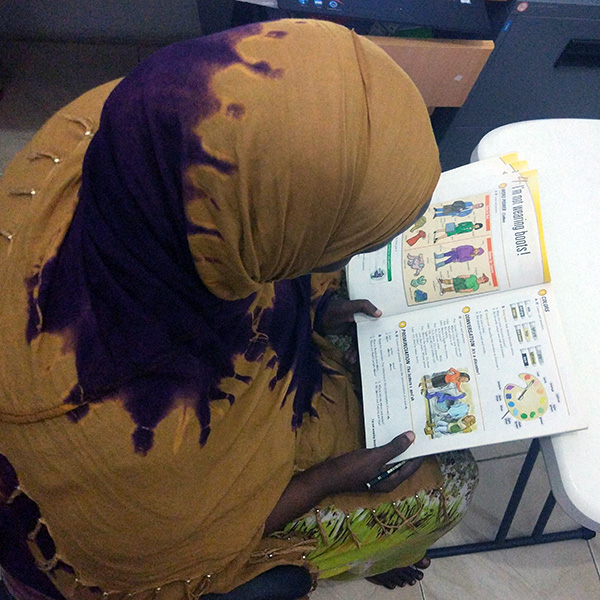Stories of Change

Khadra practices reading.
“Age should never prevent you from learning.”
Khadra* is a 45-year-old Somali refugee living in Jakarta, Indonesia. Her journey to Jakarta was a long and winding one across land, sea and air. Thanks to connections she had made before leaving Somalia, Khadra found other Somali refugees when she arrived. They helped her understand how to go to the United Nations High Commissioner for Refugees office to register as an asylum seeker.
Khadra cannot read or write, so she was lucky to find someone to help her complete her registration documents. The UNHCR referred her to CWS, and we helped her settle into a CWS-hosted group home for refugee women and girls.
That’s when she learned that for the first time in her life, education was available to her.
“Since I never attended school, I am a bit of a blind woman here,” Khadra says. She was born in an extremely remote village of just six families. The nearest town was a three-hour walk away. Even if she had been allowed or encouraged to go to a school that far away, her family had no money to pay for a uniform or supplies. So when a social worker in Jakarta told her about all of the classes and learning opportunities she had through the CWS program, she had her doubts. “At my age, I did not think I could join these activities,” she says. “But then I realized that age doesn’t matter. It all depends on your commitment.”
So, Khadra set out to learn how to read and write. Her commitment to learn was so great that these classes were not enough for her. She wanted to study more and more, so a CWS team member showed Khadra how to use a computer to study the alphabet on her own after classes ended each day. As her reading abilities grew, Khadra started reading and she practiced writing in paper exercise books. Now, Khadra can read basic sentences, and is certain that “age should never prevent you from learning. It is a lifelong process and an opportunity to not be missed. You just have to persevere.”
Education and skills development are an integral part of life for women, girls and boys in CWS-supported group homes. There are English, Indonesian, math, science and computer classes. And, life skills development opportunities help residents strengthen their readiness to live independently. Twenty-four women and girls are now living in a group home in Jakarta as are 45 unaccompanied asylum-seeking boys. All have a chance to develop new skills such as sewing, cosmetology, computer coding/programming, basic automotive mechanics and mobile phone repair. They also have a chance to study and practice arts and crafts, and to enjoy sports and yoga which, in their otherwise difficult and challenging lives, all the girls, boys and women do appreciate.
*Name changed to protect identity.
